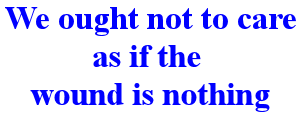Don't Cheer Me Up
continued from Page 1
Then we talked about the idea. Most could not put into words what was wrong with the notion. It just seemed wrong. They reflected that their pain was the right thing to feel. It was inappropriate to be pain-free when hit by a terrible loss. It would probably make them feel better but it would deprive them of their relationship with the dear one who died. In the final analysis they concluded it just wasn’t natural; heartache was right and good, even though awful.

Christian Pills
We discussed the way Christian friends, and others, often pass out such pills as these to take sadness away. They aren’t chemicals, but they are intended to take another’s heartache away. And most of the time people politely accept them, making it seem they really are appreciated. The women who refused my pills said these Christian pills usually are rather tasty but do not really help.
When my Father died a few years ago at the age of 98, I was handed a lot of pills. They all tasted good, e.g.,
- “Your Dad lived a good life.”
- “Your Dad was a great preacher.”
- “Your Dad was a good man.”
- “Think of all the people he helped as a Pastor.”
- “He is with the Lord.”
- “He is receiving his reward.”
Not A Pill
Then a man said this: “It is hard to lose a Dad, at any age.” That was not a pill—it was understanding. It affirmed my feelings of grief. It was a message that said, “I know it hurts.” His words didn’t take my sorrow away; they brought tears to my eyes, but they helped me much more than all of the Christian pills I’d received.
No one really wants these kinds of pills. Everyone wants their grief accepted, understood, allowed. Everyone needs friends who know how to show care.
St Paul, ages ago, knew the right prescription. He said “weep with those who weep.” This can be followed literally and is enormously appreciated. It can be seen as a metaphor and practiced in a number of ways. It means to be a friend who feels the other’s pain along with them; to be a friend who “walks with the hurting”; to be a companion who cries out to God on the other’s behalf. A touch on the hand, a gentle hug, just saying “it hurts a lot,” is the best medicine.
Remember, God heals. You walk alongside while God props up, lifts, encourages, gradually heals, helps the smashed walk again. God heals. You care. Stow your pills away.
“Bummer”
Even lesser breakdowns or failures, like a broken window, a lost wallet, or a strike-out may not be immediately ripe for a cheery word. A simple word of empathy, like “bummer”, feels a lot better and is a lot more healing than “don’t worry a second over that”.
In most of life we need to let people feel, and to be confident that they are self-healing organisms who are not always receptive to, or in need of quick fixes. Mostly, we appreciate the message that another understands when we feel disappointed, discouraged or sad. It helps when someone shows they recognize our feelings and accepts them. When they do that, they are acknowledging that disappointment, discouragement and sadness will not stay, but will fade and disappear as life goes on.
Not Cheer, but a Word of Understanding
Recently I sat down at the computer and worked intently on writing an article I wanted to send to a denominational publication. After more than an hour of intense concentration, I saved my work and went off to do another task. When I came back to my writing, I could not find it. It was not in the “My Documents” folder or anywhere else. It was gone! It was gone! There was no way of restoring or finding it. Nothing could bring it back. I was very upset and I did not want to be cheered up. I groaned loudly and my wife heard it clearly. She asked about my cries and I told her what had happened.
 Linda then had to decide what to say back to me. She could have suggested calling a computer whiz who might be able to find it, but I was grateful that she didn’t go the “fix it” route. She might have played it down, belittled the dilemma with words like, “Oh, you know what you want to say, and what you said, so sit down and do it again. It won’t take you that long.” She did not say that.
Linda then had to decide what to say back to me. She could have suggested calling a computer whiz who might be able to find it, but I was grateful that she didn’t go the “fix it” route. She might have played it down, belittled the dilemma with words like, “Oh, you know what you want to say, and what you said, so sit down and do it again. It won’t take you that long.” She did not say that.
She might have responded with, “What a little thing to be angry about. Think of the big problems in life.” Or she could have dealt me some straight, unabridged cheer pills: “It’s not the end of the world. Cheer up. Forget it.” Or... “The next version will be better than the first. That first edition was not meant to be.”
She might have tried any number of verbal showers to lift my aggravation and make me feel better. She did none of those. Instead she put her hand on my shoulder and said, “What a bum deal, to lose all that hard creative work.” That helped. It was all I needed, or wanted. Just someone speaking words of understanding with a tad of compassion mixed in.
There is a helpful brief quote in the book of Jeremiah (6:4 and 8:11) which I find useful as a guideline for approaching someone with disappointment. The context has the prophet condemning the behavior of people on many issues and includes this assessment of the people:
“They dress the wound of my people
as though it were not serious.
‘peace, peace’ they say,
when there is no peace.”
This reflection says we should take the misfortune, dismay, losses and injuries of others seriously. We are taught in these words not to say “no problem” when the other is struggling with something. We ought not to put band-aids on wounds that need real medicine and care, as if the wound is nothing.
When it comes to major heartbreak as well as the everyday frustrations and disappointments, helpful friends speak words of understanding and compassion. That is the art of loving kindness everyone ought to be able to demonstrate. Whether it is a death in the family, or a broken leg, the ones hurt are strengthened by words that demonstrate an awareness of how difficult the situation is. Therefore, choose words that acknowledge the pain, distress, heartache, misery. Endeavor to never pick words that belittle what has happened. Pick words that clearly state an understanding of the extent of the sorrow, grief, or distress.
Those who are hurtin appreciate friends who name their pain with strong words. This may even call for sentences that might exaggerate how awful the angst is, rather than risk saying something that makes it appear less painful. For instance, saying “What a terrible loss you’ve had!” is far more understanding of the other’s heartache than “Remember he is safe in the arms of Jesus.” Likewise it is better to say “What a heartache!” than “Time heals everything” if you are endeavoring to show understanding, instead of quickly trying to cheer.
Sometimes we can discern what might feel helpful to another by thoughtfully pondering what we ourselves would prefer in a similar situation. Ask yourself, “How would I feel if I was going through what they are and someone said this to me?” Thoughtful reflection like that can be enlightening.
Nevertheless, when all is said and done, in major or minor setbacks, the old rule stands that “90% of Helping is Just Showing Up”. It’s not what we say—it’s just being there. Love is the great healer, and our caring presence brings that powerful medicine most effectively. Then, thoughtful, compassionate words add the finishing touch.